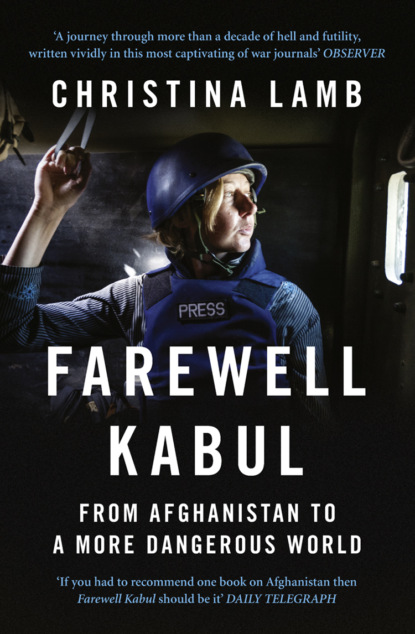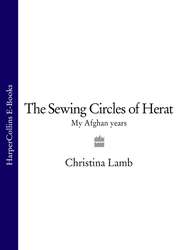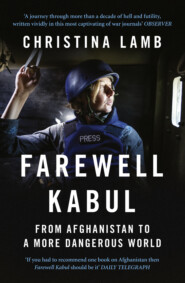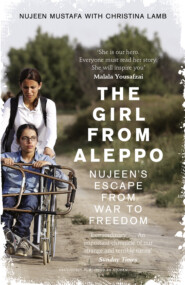По всем вопросам обращайтесь на: info@litportal.ru
(©) 2003-2024.
✖
Farewell Kabul: From Afghanistan To A More Dangerous World
Настройки чтения
Размер шрифта
Высота строк
Поля
15 The President in His Bloody Palace (#litres_trial_promo)
16 Whose Side Are You On? (#litres_trial_promo)
17 The Snake Bites Back (#litres_trial_promo)
18 The Weathermen of Kandahar (#litres_trial_promo)
19 We’ll Always Have Kabul (#litres_trial_promo)
20 Death of a Poet (#litres_trial_promo)
21 Meeting Colonel Imam (#litres_trial_promo)
PART III: THE GOOD WAR (#litres_trial_promo)
22 The View From Washington (#litres_trial_promo)
23 All About the Politics (#litres_trial_promo)
24 The Butcher of Mumbai (#litres_trial_promo)
25 Losing the Moral High Ground in Margaritaville (#litres_trial_promo)
26 Chairman Mullen and the Cadillac of the Skies (#litres_trial_promo)
PART IV: GETTING OUT (#litres_trial_promo)
27 Killing bin Laden (#litres_trial_promo)
Postscript: War Never Leaves You (#litres_trial_promo)
Appendix: The Costs of War (#litres_trial_promo)
Picture Section (#litres_trial_promo)
Acknowledgements (#litres_trial_promo)
Notes (#litres_trial_promo)
Select Bibliography (#litres_trial_promo)
Index (#litres_trial_promo)
Also by Christina Lamb (#litres_trial_promo)
About the Author (#litres_trial_promo)
About the Publisher (#litres_trial_promo)
The Leaving (#ue110efdd-99ae-5c21-ae82-f889fc3c445e)
Camp Bastion, Helmand, 26–27 October 2014
‘Ladies and gentlemen, please take your seats for the End of Operations Ceremony!’ The American voice boomed enthusiastically over the speakers as if it were the drum roll for a sporting event.
Rows of grey fold-up chairs had been arranged facing a large blast wall painted with murals marking each of the last few commands in Helmand. In front of the wall two detachments of US Marines and British troops stood to attention, flanked on either side by Afghan soldiers, who had been instructed beforehand not to hold hands. Above flew four flags – the Union Jack, the Stars and Stripes, and those of NATO and Afghanistan.
A padre read some Koranic verses, then three American generals took turns at the plinth to speak. One of them was the last commander in Helmand, Brigadier General D.D. Yoo of the US Marines, a man of Napoleonic stature both in height and personality who took the mike from the lectern to strut in front of the audience as if about to burst into song.
Phrases from the speakers, each as determinedly upbeat as the announcer, swam in the hot air like speech bubbles. No one spoke of defeat, or retreat, or withdrawal in the face of an intransigent enemy, or of publics and politicians back home who could take no more flag-draped coffins.
‘This transfer is a sign of progress,’ said Brigadier General Yoo. ‘It is not about the coalition. It is really about the Afghans and what they have achieved over the last thirteen years.’
Helmand would now be under control of Afghan forces, commanded by Major General Sayed Malouk. ‘We are ready,’ Malouk insisted, even though he didn’t quite look me in the eye as he said it. He had already lost almost eight hundred men that fighting season, and had himself narrowly escaped a roadside bomb in Sangin.
No British officer spoke, and Britain’s eight-year role in Helmand garnered barely a mention, which seemed odd, for this had been the country’s longest war in modern times, and its hardest fighting for more than half a century.
The hot sun beat down and guests swigged from bottles of mineral water as ‘God Save the Queen’ and ‘The Star-Spangled Banner’ were played and the flags were lowered. The Union Jack was carefully folded, and handed to Brigadier Rob Thomson, the last British commander. Only the Afghan flag was left fluttering as Camp Bastion came under Afghan command, and Britain’s fourth war in Afghanistan officially came to an end.
Guests were taken into a cabin where a banquet lunch of smoked salmon, slow-cooked beef and chocolate fudge cake had been specially flown in. The genial Afghan army chief General Sher Mohammad Karimi presented Brigadier General Yoo with a commemorative certificate and a carpet, and both sides took souvenir photographs. It all seemed surreal.
I felt tears stinging my face. Four hundred and fifty-three British soldiers had been lost in Afghanistan, of whom 404 died in Helmand, many of them young enough to be my son. Hundreds more had lost limbs to roadside bombs or been mentally scarred for life. Tens of thousands of Afghans had lost relatives or homes, and I had met many Helmandis living as refugees in a camp in Kabul, begging for scraps of dry bread and meat fat, and burying children in the mornings who had frozen to death overnight in the winter cold.
Watching the flag come down felt like the end of everything. This fierce, turtle-shaped country had been part of my entire adult life, longer than any relationship or job. It was twenty-seven years since I’d first come to Afghanistan as a young wannabe foreign correspondent, crossing the Hindu Kush with the mujaheddin fighting the Russians, and falling unequivocally in love with this land of pomegranates and war. I’d had narrow escapes in muddy fields nearby, both with those mujaheddin who went on to become Taliban, and then with British soldiers fighting those Taliban. My first big assignment was covering the Soviet withdrawal in 1989, and never in my wildest dreams had I imagined I would be back a quarter of a century later, covering my own country’s ignominious departure. Just as after the Russians had gone, everyone had lost interest in Afghanistan, now Western troops were leaving I wondered if anyone would care.
The Union Jack at Bastion was the last to come down over Helmand. Once there had been 137 British bases across the province, but over the last year these had all been bulldozed one by one and turned back to desert, home again only to scorpions and camel spiders.
Some, in places like Sangin, Musa Qala and Naw Zad, had become unlikely household names back in Britain. Many were small, primitive FOBs – Forward Operating Bases: like Camp Inkerman, which was known to everyone as Camp Incoming because it was so frequently hit. Conditions in these places were described as ‘austere’, which meant showers were hot bags once a week, the dust so deep that you felt it sucking at your boots, and the toilet a stinking pit that was targeted so often it was known as Tali-alley.
Bastion was where it had all started. When it opened in 2006 it was a gritty, grey, sprawling place on the edge of the Dasht-e-Margo, or Desert of Death, that had previously been used for camel-grazing, according to the agreement signed by the Defence Secretary John Reid. Over the years, like the war, it had been expanded and expanded to become Britain’s biggest overseas camp since World War II, the first billion-pound base. At its height it housed more than 30,000 people with a coffee bar, Pizza Hut, Kentucky Fried Chicken, three gyms, state-of-the-art hospital and even a water-bottling plant producing 15,000 gallons of Bastion Water a day. The camp’s three canteens had served a hundred million meals since 2006, getting through 66,500 eggs a week and 6,000 tubs of ice cream, all flown in. Its airfield saw so many flights a day – six or seven hundred, from jumbo jets to unmanned Reapers – that it had become Britain’s third busiest airport.
Now everything had been packed up, bar-coded and sent back or destroyed. The detritus of twenty-first-century war is so vast that after more than eight years in Helmand, Lieutenant Colonel Laurence Quinn, the engineer who oversaw both its building and its dismantling, compared it to packing up ‘a town the size of Aldershot with Gatwick airport bolted on’. Five thousand five hundred shipping containers had gone back, mostly by air. The hospital, the pie shop in Lashkar Gah, the air-conditioning units, the Naafi shop, the water-bottling plant had all gone, as had the tented camps, one of them ending up sheltering refugees in a new war in Iraq. The naughty posters had been stripped down and the rockery dismantled. Thousands of unspent bullets were fed into a popcorn machine to be harmlessly exploded. Fifty aircraft had been sent back, and 3,300 armoured vehicles, including Mastiffs and Wolfhounds, six-wheeled armour-caged monsters costing more than £1 million apiece, so different from the open Snatch Land Rovers in which troops had started out and that the Americans mocked as ‘safari vehicles’. The security cameras and radios were stripped from the control towers, leaving the Afghans who would man them no way to keep watch on the perimeter or to communicate. Hardest of all to pack was the massive Giraffe rocket-detector. Last to go was the airport radar and a foam-dispensing fire engine. The Afghans joked sourly that the British would have taken the concrete walls if they could.
As if the foreigners were trying to erase all signs of their presence, the murals had been painted over. One of the most moving sights at Bastion had been the Memorial Wall to the fallen, with 453 brass plates bearing the names of all those killed, under the lines from the First World War poet John Maxwell Edmonds: ‘When you go home tell them of us and say/for your tomorrow we gave our today.’ Even that had been dismantled, and there would be no monument in Helmand to British lives lost. There would be no voices calling ‘We are the dead,’ for the poppy fields of Helmand would be very different from those of Flanders a century earlier.
On the last night, even the electricity was switched off, a young British corporal, Sam Boswell, nervously turning off the final switch at 3.30 a.m. on Monday, 27 October. ‘I double-checked and it was definitely off,’ he told me afterwards. It was eerie driving around the camp in its final hours of British presence. Under the faint glimmer of a crescent moon reclining low in the sky, abandoned patches of desert stretched for miles and miles, ringed by fences of barbed wire. The only buildings left were the control tower, some giant hangars that had housed workshops or aircraft, and the line of towers around the twenty-three-mile perimeter. Adding to the apocalyptic air, a few bonfires were burning to incinerate the last remaining sensitive documents.
But the strangest thing was not the emptiness. The Bastion I knew had always hummed with the sound of large generators blasting air into each of the tented camps, and the constant take-off and landing of planes. Now there was silence. For that last night the remaining thousand or so British and American troops withdrew into a small camp by the side of the airfield. The outer perimeter towers were guarded till the end, and ‘lumes’, or illumination mortars, were fired off in a final expensive fireworks display meant to present a show of strength to the Taliban.
In the countdown to what was called ‘H Hour’, the withdrawal was coordinated from a control room facing the runway. British and American soldiers sat at a T-shaped table mounted with framed photographs of the Queen and the action-movie star Chuck Norris, and tapped away at tablets or spoke on radios. In front of them a giant screen played a feed from a Reaper somewhere overhead. The footage showed a compound just south of Bastion, where two men were clearly visible walking around outside. As we watched, the men fired off a rocket-propelled grenade. I was quickly shuffled out while the soldiers discussed whether to respond. In the end they did nothing.
For the final six hours before the withdrawal the air above us was full of Apaches, Cobras, Tornadoes and B1 bombers circling around. Nothing was left to chance. ‘We don’t want anything that looks like helicopters fleeing from the US Embassy roof in Saigon,’ had been the instructions from Whitehall to RAF officers orchestrating the event.
The Afghan forces that the British and Americans had been talking up so highly were not being trusted to guard their exit – even the perimeter guard towers were only handed over at the last minute. The air-traffic controllers destroyed equipment in the control tower before leaving. The final wave of aircraft was guided out by an airborne control team on a Hercules.
In the end the departure was so perfectly choreographed one could almost forget it was a retreat. Fifteen waves of Hercules transport planes and a last one of choppers – four monstrous CH53s, two Hueys and two British Chinooks. It was the biggest airborne withdrawal since the Berlin Airlift. I went on one of the last waves to Kandahar, landing in time to watch the final helicopters swooping in and disgorging the troops, so cinematic that the only thing missing was a soundtrack.
The airlift went so smoothly it finished more than three hours ahead of schedule, at 11.54 a.m. on Monday, 27 October. Yet even before the soldiers had set foot back on home soil, recriminations started. There were calls for a Chilcot inquiry like that into the war in Iraq, and the country looked set for the same kind of long and bitter blame game as that which followed America’s involvement in Vietnam. Lord Paddy Ashdown, the former leader of the Liberal Democrats, called it ‘catastrophic’. Admiral Lord West, the former First Sea Lord, described the war as an ‘abject failure’, and demanded a public inquiry. Lieutenant Colonel Richard Williams, a former commander of the SAS, wrote an article in The Times which lambasted the lack of planning, adding, ‘It is also clear to me that we did not run or command it well either.’









